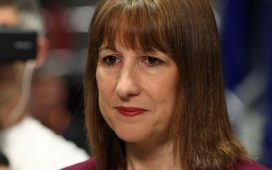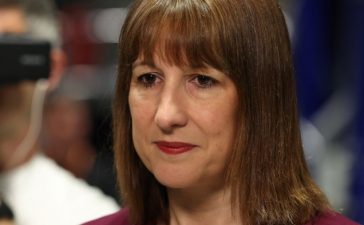Unlock the Editor’s Digest for free
Roula Khalaf, Editor of the FT, selects her favourite stories in this weekly newsletter.
UK economic growth will accelerate this year and next as falling inflation and interest rates strengthen domestic demand, the IMF has said, in a boost to chancellor Rachel Reeves ahead of her first Budget next week.
The economy will grow by 1.1 per cent this year — a 0.4 percentage point upgrade on its previous projections — the fund said on Tuesday.
In 2025, growth will pick up further to 1.5 per cent, the third-strongest forecast among the G7 group of advanced economies, the fund added in its latest World Economic Outlook.
IMF chief economist Pierre-Olivier Gourinchas told the Financial Times that improving inflation might allow the Bank of England to cut interest rates more quickly — a further boost to the economy.
But, speaking before the release of the IMF report, he warned that it would be difficult for Reeves to curb public debt while keeping the economy growing.
“Tough choices are going to have to be made,” Gourinchas said in an interview. “There is a need to bring the debt down . . . The question is: How do you do that in a way that doesn’t kill the growth?”
Reeves had previously claimed that the Labour government had inherited the “worst set of circumstances since the second world war” when it won power in July, a verdict fiercely denied by the Conservatives.
In spite of the IMF’s more upbeat assessment, Reeves’s allies cautioned that improved growth was unlikely to alleviate the need for big tax rises in the Budget on October 30, when she is looking to close a funding gap of about £40bn.
Reeves said it was “welcome that the IMF have upgraded our growth forecast for this year, but I know there is more work to do”.
“That is why the Budget next week will be about fixing the foundations to deliver change, so we can protect working people, fix the NHS and rebuild Britain,” she added.
Tuesday’s change takes the IMF’s forecast above the Office for Budget Responsibility’s most recent public assessment in March, which predicted growth of 0.8 per cent this year.
But the UK fiscal watchdog’s prediction for the following year is for growth of 1.9 per cent — more optimistic than the IMF’s latest outlook.
The OBR has also been more upbeat than many analysts about the UK’s productivity and growth potential in the coming years, dampening hopes of any economic upgrades in next week’s Budget.
The OBR submitted its latest pre-Budget forecast to Reeves on Tuesday.

The IMF said fiscal consolidation was “urgent” around the world, especially given that central banks are easing pressure on economies by lowering interest rates.
However, it also urged countries to boost investment in the green transition and infrastructure, saying this could help “crowd in the private sector”.
Gourinchas said some of the UK government’s policies, such as proposals to speed up planning permission for infrastructure and construction projects, resonated well with the fund’s recommendations in a regular health check in July.
But a full assessment of the government’s economic plan would need to follow the details of the Budget, he added.
After barely growing last year at just 0.3 per cent, the UK economy began to pick up in the first half of 2024 on the back of firmer household spending.
Wages have now outpaced inflation for 15 consecutive months, reversing the contraction of 2022 and part of 2023 and helping to support spending.
Despite the fund’s forecast that the UK would be the third-fastest growing economy in the G7 in 2025, it projects that it will remain some distance behind Canada and the US, which are both estimated to grow by well above 2 per cent.
Inflation will remain slightly higher than in most other G7 countries, running at 2.1 per cent next year, the joint-highest in the group alongside Italy.
But Gourinchas said recent data on services inflation in particular had been encouraging, helping pull down headline inflation to 1.7 per cent in September and below the BoE’s 2 per cent target for the first time in more than three years.
After lowering the benchmark interest rate to 5 per cent in August, BoE policymakers are widely expected to vote for a fresh quarter-point interest rate cut in November.
The baseline IMF forecast is for one further rate reduction this year and four in 2025. But Gourinchas said the BoE’s Monetary Policy Committee could potentially “be a little bit more aggressive”, echoing recent comments by BoE governor Andrew Bailey.










